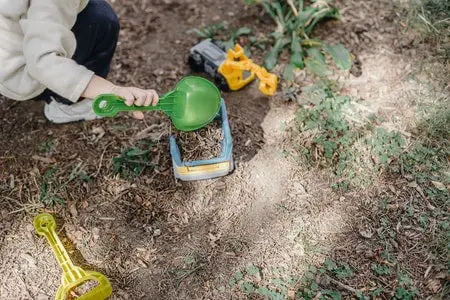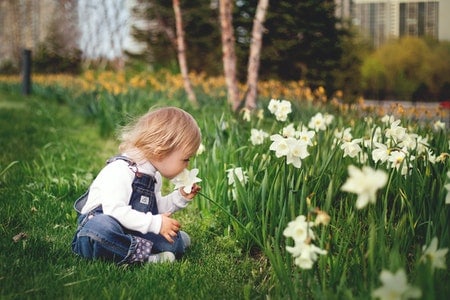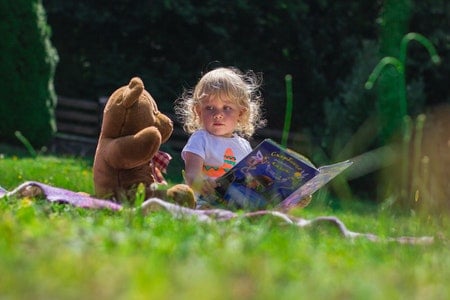Did you know gardening offers your child many developmental benefits? Yes, it really does.
Some adults are of the opinion that gardening is harmful for kids, mostly because of the chemicals, manure, and tools involved. That is untrue though. Gardening, like any activity, has its dangers, but the benefits far outweigh them.
Gardening is the perfect outdoor activity. Not only does it take your child away from their screen, it gets them curious and experimenting with nature. But that’s not the only benefit of gardening to your child’s development.
Here are six major ones:
1. Promotes Healthy Eating
As you know, most children are picky eaters and will take candy over vegetables any day. However, gardening can turn that around. Why? What child wouldn’t want to eat the fruits of their labour? It would excite them, to watch their vegetable or fruit grow. And it would excite them even more fun to eat it.

The more they grow their plants, the more they are going to want to eat them. Before you know it, you’ll have your child eating fruits and vegetables like you couldn’t imagine. So, instead of insisting that your kid eat healthy, or trying to trick them into eating healthy, you can watch with pride as they do this all by themselves.
And this wouldn’t be short term, your kids will grow into adults who favour healthy foods over junk, and they will raise kids who will do the same.
2. Teaches Your Child Responsibility and Patience
A garden of their own is something they’d have to take care of themselves. Sure, you will supervise and direct but, the ultimate responsibility is theirs. They’ll have to ensure their plants get enough water, nutrient and sunlight, especially when they see what happens when it doesn’t.
To help them master this responsibility, prepare a schedule or calendar for their garden. Or, if they are older, have them download an app that will do this for them. There are garden apps that track the planting process from when it goes into the ground, to when it’s harvested.

Gardening will also teach your child patience. Imagine that they’ve planted some fruit or vegetable that they can’t wait to harvest. They’ll learn that plants have a process, one that can’t be hurried. And this way, they’ll wait patiently for it.
3. Helps Them Become Better Organisers and Planners
Setting up a garden involves planning and organising. A step-by-step process that ensures things go the way they should. This is what your child will be exposed to; the opportunity to plan what fruits and veggies go where and when they should go.
For instance, some plants grow better in the summer, and others grow better in the winter. Your child can decide and research about which goes when and plan for it. It will teach them the process of gathering and storing seeds for the next planting season.
This habit will extend to their life and school work. They’ll learn the advantages of planning and do that more. In a lot of ways, gardening is a metaphor for life. What you put in is what you’ll get. This naturally translates to time, planning and effort, all of which are necessary for a balanced life.
4. Improves Their Curiosity and Introduces Them to Science
There’s no better way to improve your child’s curiosity than through gardening. You tell them that a little seed is going to grow into a tomato or carrot, and they are instantly interested to see how that will happen.

Of course, as they garden, they will ask curious questions like, why is the grass green? Why do butterflies come to flowers? What happens when they do? Why do some plants grow bigger and faster than others?
There’s a lot of science in gardening and it happens in the most beautiful way. Gardening could be the way for your kids to learn science and explore it even out of gardening. It could also lead them to become creative. A child who becomes really interested in gardening could think of creative ways to grow plants. This will lead them to explore ideas, make mistakes and learn from them.
5. Engages All Five Senses
Gardening is one activity that interacts with your child’s five senses. It’s a place where they can touch and smell fruits, identify one colour from another, listen for butterflies and other playful insects, or the sound of rustling leaves. And of course, taste the delicious fruits of their labour.
By engaging all of their senses, gardening helps your child develop an acute sense of smell, touch, hearing, sight and taste, in a way that most kids their age may not. They could be able to tell if a vegetable is fit for eating by looking at it, or things that move in the grass, by the sound of it.

There are few activities that can do this the way gardening can. And of course, this development of their senses will extend to other things too. They’ll become more discerning.
6. Teaches Them Social and Interpersonal Skills
This is one advantage of gardening, especially in a school setting. In a school garden, kids are required to work together to ensure the garden thrives. This will involve being part of a team, or leading one and discussing and coming up with ideas that will help their plants grow. This kind of interaction can bring a shy child out of his or her shell.
Also, in their curiosity to want to know more, it will encourage them to ask questions and take part in school projects.
For the home, gardening is the perfect time to bond with your child. Away from the noise or the distractions from their screen.
You can ask them about school, life and everything in between.
Lastly, gardening is very therapeutic for kids. It’s the perfect way to relieve stress and anxiety. It will provide your kid time alone to relax, embrace the silence and be comfortable by themselves.




